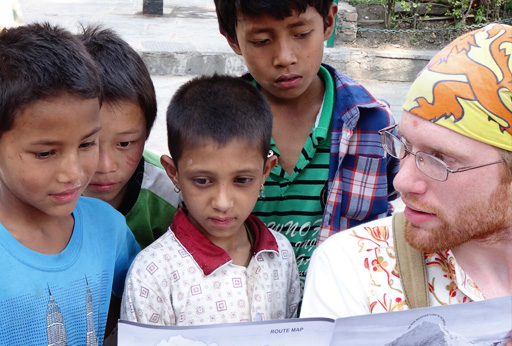Learning, Around the World

Students in the Morris-August Honors Program at Keene State are going places – places like Belize, Nicaragua, Bosnia-Herzegovina, Cuba, Peru, and Ecuador. Those admitted to the program for academically motivated students are required to enroll in Global Engagement, a course that follows a semester of learning about a country’s culture, politics, environment, and history with a two-and-a-half week faculty-led trip to that country. “Travel just demands critical and creative inquiry about who you are in relationship to other places and other cultures,” says Associate Professor Robert Kostick, Honors Program director. “You can’t help but be challenged.”
Thanks to the William T. Morris Foundation and its president, Bruce August ’13, the challenges don’t include financial pressures. The foundation makes it possible for Honors Program students to undertake the required travel by providing funds that offset most of the cost of the trips. The Global Engagement trips combine interactions with local residents, research, visits to museums and historic sites, community service, and sightseeing, and sometimes include homestays with families. Each is led by a pair of Keene State professors, who put in considerable time arranging itineraries, transit, and safe (though often rustic) lodgings.
Two Global Engagement classes were offered during the 2014 spring semester, one on Nepal and one on South Africa. The trips left shortly after the end of the school year.
Danielle Fallette ’16, who traveled to Nepal, noted that the semester of study that preceded the trip was critical. “You have to learn about a culture to understand it and not be overwhelmed by it,” she says. “We talked about mindfulness and learned how to be open-minded and find connections. Because of that we could take in more on the trip and learn more from it.” Due to her time in Nepal, she is now considering applying to the Peace Corps when she graduates. “If I travel anywhere, I don’t want to travel as a tourist. I want to go into the country and learn about it,” she says.
Katherine Marren ’16, who blogged about the Honors Program trip to South Africa, which focused on apartheid and the country post-apartheid, calls the trip “extremely powerful for everyone. We were all taken out of our comfort zones at some point or another, and learned so much because of that.” The travel, she says, changed her life. “I am more aware of my own culture and society, and I feel more of a need to have a global presence.”
The William T. Morris Foundation, says Kostick, invests generously in the Honors trips, which are not inexpensive. (The foundation also provides major support for all other aspects of the Honors Program, including scholarships and support for high-impact learning practices.) “It’s really an investment,” says Kostick, who notes that it comes with expectations for the students.
“Oftentimes they travel as second-semester sophomores, sometimes juniors. We’re not sending them out senior year and saying, ‘This is a great carrot at the end of the stick, now go graduate and go out and do good things in the world,’” he adds. The students are expected to return to campus and, informally and formally, share their experiences with the College community. They participate in the annual Academic Excellence Conference; they speak to parents during Family Weekend; they give presentations and sit on panels; they talk with other students.
“Travel is hard,” Kostick says, “but some locations offer the best of everything and the worst of everything. You’re challenged the most and you’re the most free, but not at the same time. It’s the up and down of everything. When students are in that environment and they’re working with good faculty, they grow personally and intellectually.”

